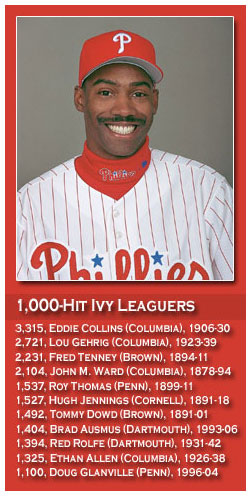Doug Glanville
After collecting more than 1,000 hits as a major league ballplayer, Penn graduate Doug Glanville is now staring down a new venture -- building homes with an eye on the environment.
Over 131 seasons, the eight Ivy League schools have produced 243 major leaguers. The first was Yale's James "Orator" O'Rourke, who played in the National League's first game on April 22, 1876, where he also made the league's first hit. The newest Ivy major leaguer is Yale's Craig Breslow, who debuted July 23, 2005, and is now a reliever with the Boston Red Sox.
Doug Glanville's major league career places him among the elite of these Ivy major leaguers. Over nine seasons with the Chicago Cubs, Philadelphia Phillies, and Texas Rangers, Penn's Glanville assembled the best career of any Ivy League position player in more than 60 years. Playing centerfield, he compiled a lifetime batting average of .277, with exactly 1100 hits. His career hit total places him 11th all-time among Ivy major leaguers, and his name appears 17 times among the leaders in batting categories - alongside such baseball immortals as Red Rolfe, Eddie Collins, and Lou Gehrig.
It was a surprisingly long road to the majors for Glanville. He attracted attention from scouts in high school when he hit over .500 his junior and senior years and earned all-County and all-State (New Jersey) honors. But "I turned them away," says Glanville, by insisting he was going to college. He chose Penn because "I could have balance between academics and sports, plus the [more academically friendly] Ivy League schedule,"
He's never regretted his choice. "Penn was a great experience," says Glanville, "unbelievable, networking, phenomenal presence." And he could take a serious academic load and play baseball. "I took all the classes I wanted to take, even folklore, public policy, and management," he says, graduating with a 3.2 GPA in Systems Engineering in 1993.
His baseball didn't suffer, either. He was an outstanding player for Penn, becoming one of only 14 Penn players in the 128-year history of the program to bat over .400 in a season, and earning GTE Academic All-American and All-Ivy first team honors in 1991. But it was his performance in the 1990 Cape Cod League, a summer 'wood-bat league' where he was voted Pro Prospect of the Year, that again piqued the scouts' interest.
His devotion to academics, however, made scouts doubt his desire. One game, against Temple in the spring of 1991, crystallized their doubts. A number of scouts were at the game -- but Glanville wasn't. He was studying for finals. "I took a lot of heat for the Temple game," he now says.
It didn't end there. He was drafted in the first round by the Chicago Cubs, but contract negotiations were tinged by the perception that Glanville lacked the desire to play. "Doug needs to sit down and decide if he wants to play or not," Cubs scouting director Dick Balderson told Baseball America in 1991. It continued in the minor leagues. "Coming from an Ivy League school, Doug was never used to the discipline it takes to play baseball," said Cubs instructor Jimmy Piersall during Glanville's time in the minors (Glanville reports that later Piersall became one of his biggest supporters).
The net effect of these feelings was that Glanville spent five-plus seasons in the minors, a passage on which he simply comments "it was very difficult at the time." When he reached the majors, though, his performance was well worth the wait.

Playing center field Glanville hit an even .300 in 1997, becoming the first Ivy major leaguer to hit .300 or better since Brown's Bill Almon hit .301 for the Chicago White Sox in 1981. He followed that up with a spectacular season in 1999. Playing for the Philadelphia Phillies, he batted .325 and amassed 203 hits, the best single season of any Ivy major leaguer since Dartmouth's Red Rolfe hit .329 with 213 hits for the 1939 New York Yankees. In 2003 he capped his career with an extra-inning triple, driving in the winning run for the Chicago Cubs in game three of the National League Championship Series against the eventual world champion Florida Marlins.
Since his retirement in 2005 Glanville has married, settled in Chicago, and started as managing partner for Metropolitan Development, a local real estate developer. He's also at Penn quite a bit these days, having been appointed to the School of Engineering's Board of Overseers. "It gives me more and more appreciation of the school," he says.
Glanville describes Metropolitan Development as "a custom home builder in Glen Ellyn and Wheaton. I work with the architects and on interior design." But he's not content to limit his involvement to the more conventional aspects of home building. "We're getting into environmentally-friendly concepts, 'green luxury'," he says. Here again the Penn influence shows.
"I'm working with Muscoe Martin," who's a visiting lecturer at Penn, "and Chairman of the Green Building Council," according to Glanville. He's enthusiastic about his association with Martin. "We want to take it to the next level, have an impact in the community, maybe go solar or geothermal, a hybrid house. With my education and career I didn't want to settle down and just build houses."
Ed. note - Doug Glanville's coach at Penn was Bob Seddon, who over a 34-year career at Penn through 2005, had 621 wins and five Ivy League championships, and coached 50 first-team All Ivy players, four Ivy League Pitchers of the Year and three Ivy League Players of the Year. He also coached two future major leaguers, in addition to Glanville: New York Yankees pitcher Steve Adkins (1990), and current Texas Ranger Mark DeRosa.
— Stephen Eschenbach
|
|